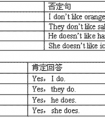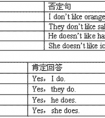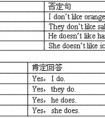句型转换。1. Let's go to the zoo together. (否定句)_______________________________________________________________________ 2. Turn on the radio. (用he做主语-六年级英语
题文
| 句型转换。 |
|
1. Let's go to the zoo together. (否定句) |
答案
| 1. Let's not go to the zoo together. 2. He will turn on the radio. 3. What are you going to do? 4. How many people are coming to the party? |
据专家权威分析,试题“句型转换。1. Let's go to the zoo together. (否定句)______..”主要考查你对 祈使句,一般将来时,特殊疑问句,疑问词组 等考点的理解。关于这些考点的“档案”如下:
祈使句一般将来时特殊疑问句疑问词组
考点名称:祈使句
祈使句:
表达说话人对对方的叮嘱、劝告、希望、禁止、请求或命令等。
祈使句一般以动词原形开头,无时态和数的变化,句末用句号或感叹号,用降调。
祈使句的肯定结构是:
动词原形+其他;
否定结构是:
Don't+动词+其他。
另外,Let's也能引导祈使句, 其后接动词原形。
例:Please open the door. 请打开门。
Don't be late next time. 下次别迟到。
Don't run on the train. 不要在火车上跑。
Let's go to school. 让我们去上学。祈使句含义:
1. 表请求
Pass me the sugar, please. 请把糖递给我。
2. 表命令
Put up your hands. 举手。
Fill in this form. 把这个表填好。
3. 表建议
Let’s have dinner together. 我们共进晚餐吧。
4. 表邀请
Come in and have a seat. 进来请坐。
Help yourself to some fruits. 请吃水果。
5. 表警告
Hurry up or you will be late.抓紧点,不然你要迟到了。
Do that again and you”ll be in trouble.要是再干那事,你会有麻烦的。
6. 表禁止
Don’t touch the exhibits.不要触摸展品。
Don’t play on the road.不要在马路上玩耍。
7. 表叮嘱
Be sure to get there before nine. 务必在九点前赶到那里。
Take care not to catch cold. 小心别着凉了。
8. 表号召
Workers of all countries, unite! 全世界工人阶级联合起来!
9. 表祝愿
Have a good trip. 祝你旅途愉快。
祈使句一般特点:
1.谓语大都是表示行为动作的动词或动词性词语,表示的动作是未然的。
2.主语一般是第二人称代词“你、你们”,往往省去。也有时用第一人称“咱们”作主语。- 祈使句用法口令:
祈使句无主语,主语you常省去;
动词原形谓语当,句首加don't否定变;
朗读应当用降调,句末常标感叹号。
考点名称:一般将来时
一般将来时:
表示将来某个时间要发生的动作或存在的状态,也表示将来经常或反复发生的动作。
由“助动词will+动词原形”构成。“be going to+动词原形”结构是将来时的另一种形式,表示将要发生的事或者事先经过考虑打算去做某事。
例:We will go to Shanghai next year. 明年我们要去上海。
We are going to have a football match tomorrow. 我们明天要举行一场足球比赛。
Tom is going to have a bath. 汤姆要去洗澡了。一般将来时常见结构:
1、will / shall + 动词原形(否定句在will/shall后加not)
will 常简略为 'll,并与主语连写在一起,如: I'll,she'll,he'll,it'll,we'll,you'll,they'll。
一般疑问句如用will you…?其简略答语须是Yes,I will或 No,I won't;如用 Shall I…?(较少见)其简略答语须是 Yes,I shall.或 No, I shall not.
这种方法一般单纯地表示将来某个时间将要发生的动作或存在的状态。will用于各种人称;shall只用于第一人称。 例如 :
I will / shall go to visit him next week. 下周我将去拜访他。
What time shall we go there tomorrow? 明天我们几点去那儿?
2、be going to 动词原形
be going to 相当于一个助动词(其中be有人称和数的变化),与它后面的动词原形一起构成谓语。用来表示近期将要发生的动作以及计划、安排和打算要做的事。例如:
There is going to be a football match this afternoon.今天下午将有一场足球赛。
I‘m going to go to the park. 我将要去公园。
常用结构:
1、用于"I expect, I'm sure, I think, I wonder宾语从句"中。
Don't worry about the exam. I'm sure you'll pass.
不要担心这次考试,我确信你会通过的。
2、用于祈使句和陈述句中。
Work hard and you will succeed.
如果你努力,就会成功的。
3、与表示时间或条件的状语从句连用。
I'll let you know as soon as he arrives.
他一到我就通知你。- be going to与will的区别:
be going to与will两者都可表示将要发生的事、将要去做某事,但它们有如下几点区别:
1. be going to 表示近期、将要发生的事情,will 表示的将来的时间则较远一些,如:
He is going to write a letter tonight.
He will write a book one day.
2. be going to 表示根据主观判断将来肯定发生的事情,will表示客观上将来势必发生的事情。
He is seriously ill. He is going to die.
He will be twenty years old.
3. be going to 含有“计划,准备”的意思,而 will 则没有这个意思,如:
She is going to lend us her book.
He will be here in half an hour.
4.在有条件从句的主句中,一般不用 be going to, 而多用will, 如:
If any beasts comes at you, I'll stay with you and help you
注意
be going to和will在含义和用法上稍有不同。be going to往往表示事先经过考虑的打算;will多表示意愿,决心。两者有时不能互换。如:
She is studying hard and is going to try for the exams.她正努力学习并尝试参加考试。(is going to不能用will替换) - 一般将来时一般用法:
(1)一般将来时表示将要发生的动作或情况。
例如:I will(shall) arrive tomorrow.我明天到。(主语是第一人称时最好用shall)
Will you be free tonight? 你今晚有空吗?
We won’t (shan’t) be busy this evening. 我们今晚不忙。
(2)在一般将来时的句子中,有时有表示将来时间的状语,有时没有时间状语,这时要从意思上判断是否指未来的动作或情况。例如:
Will she come? 她(会)来吗?
(3)在以第一人称I或we作主语的问句中,一般使用助动词shall,这时或是征求对方的意见,或是询问一个情况(b):
a. Where shall we meet? 我们在哪儿碰头?
b. Shall we have any classes tomorrow?明天我们有课吗?
在这类问句中,近几年来也有不少人用will,特别是在美国。例如:
- 最新内容
- 相关内容
- 网友推荐
- 图文推荐
| [家长教育] 孩子为什么会和父母感情疏离? (2019-07-14) |
| [教师分享] 给远方姐姐的一封信 (2018-11-07) |
| [教师分享] 伸缩门 (2018-11-07) |
| [教师分享] 回家乡 (2018-11-07) |
| [教师分享] 是风味也是人间 (2018-11-07) |
| [教师分享] 一句格言的启示 (2018-11-07) |
| [教师分享] 无规矩不成方圆 (2018-11-07) |
| [教师分享] 第十届全国教育名家论坛有感(二) (2018-11-07) |
| [教师分享] 贪玩的小狗 (2018-11-07) |
| [教师分享] 未命名文章 (2018-11-07) |



![Let's ____________ somefun.[ ]A.haveB.hasC.had-五年级英语](http://www.00-edu.com/d/file/ks/4/1/67/2019-09-01/smallee0c5b0456fd527ff36ce160b4dfe7ad1567348511.gif)

![Whatdoesthesignmean?(这标志是什么意思) [ ]A.Turnright!B.Don'tturnrightC.Turnleft!-六年级英语](http://www.00-edu.com/d/file/ks/4/1/67/2019-09-01/small641a4bfa9c93e8269087b9baa4d8d4411567348144.gif)


